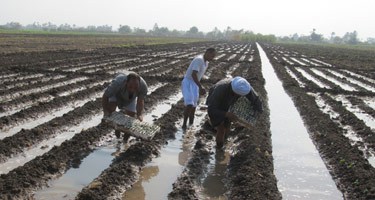“Agriculture will be critical to future economic growth in Egypt,” says the International Labour Organization (ILO), “but only if the laws on farmers’ cooperatives are reformed.”
While the political reverberations of the 2011 revolution continue to resound throughout Egypt, many of the country’s farmers are hoping positive change will reach the agricultural sector.
Farmers like Mohamed Farghaly and Ahmed El Komy, from the Upper Egypt village of Rafaa Al Tahtawy are hoping for a change in the law – with help from the International Labour Organization (ILO) – so that their businesses can become more profitable.
That could, in turn, boost Egypt’s economy, since agriculture is the largest contributor to its GDP, even though less than 4 per cent of the land is arable. El Komy, another small-scale farmer, heads the cooperative, which serves around 300 members.
Too Much Government Control
“There is too much government control and bureaucracy. We don’t have full control of our finances. We would like to see someone from the co-op be a representative in the local governorate (state),” says El Komy.
The cooperative enables small farmers to share and manage resources, infrastructure and services such as irrigation equipment, fertilizers and energy supplies.
“Everyone in the village is a member of the co-op. The farmers are badly in need of it because it supports them, for instance, by getting good prices on fertilizer and by managing and maintaining the irrigation system.”
Improving Yields
The cooperative is one of a number of organizations in Upper Egypt whose members have, since 2010, benefited from SALASEL, a programme involving the ILO, UNDP, UNIDO, UNWOMEN and the Egyptian government.
Farghaly, 55, says he began farming at the age of 5 on his father’s land – but that before he received guidance from SALASEL, yields were low and marketing channels very limited.
“The quality and the amount of the food I produce have tripled because I have learnt new techniques in using fertilizer and pesticides. Also I was dependent on traders to market my produce but they are controlling the prices. SALASEL has helped us reach much broader exporting markets.”
With the SALASEL project ending in June this year, ILO is looking at how farmers’ cooperatives can become more effective and sustainable, particularly in the context of the revolution.
Law Reform
Eighteen million people live below the poverty line in Egypt, most of them in agricultural areas. ILO expert Huseyin Polat says agriculture provides critical income and employment for rural people, which in turn can help reduce poverty.
However, the potential of the agricultural sector is hampered by laws regulating the cooperative movement.
“After the revolution, SALASEL tried to bring farmers together to strengthen the cooperatives in the new system. There is a need for reform, to make co-ops more member-controlled rather than being an extended arm of the government,” Polat explains.
Current Laws Prohibit Cooperatives from Importing, Export Agricultural Produce Directly
The current laws prohibit co-ops from establishing or participating in companies. They cannot import and export agricultural produce directly or establish funds to finance production processes. In addition, most co-ops have weak institutional structures because they are poorly governed.
In January, the ILO held a workshop in Cairo with government representatives, cooperative farmers and others with an interest in the issue to discuss the strengthening of cooperatives.
Polat also toured Upper Egypt to explore the views of unions, farmers’ groups and government officials, including Saber Abd El Fatah, Under Secretary at the Agriculture and Land Reclamation Ministry. He agreed that the cooperative law needs to be amended, but added that donor support and training is a key issue.
How to Establish Links Between Small Farmers and High End Markets
“The real change will happen if we offer the existing cooperatives the necessary training to better manage their organizations as for-profit entities that play a role in establishing links between small farmers and high end markets.
Donor organizations should start working closely on offering reform programs with training and finance to help the cooperatives on all different levels.”
Egypt’s new constitution includes a commitment to support the cooperative system – which Polat says is an ideal time to push for changes in the law and reforms within cooperatives.
“There is a great potential for these co-ops to create many more jobs, to reduce migration of people and help them get jobs in rural areas.”
*Source: International Labour Organization news release.










